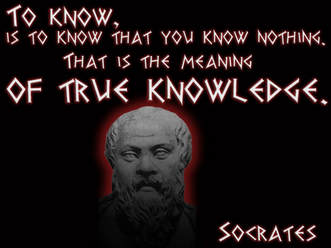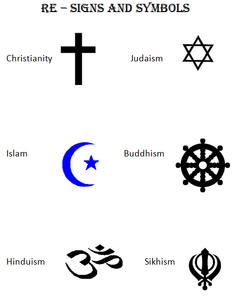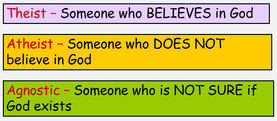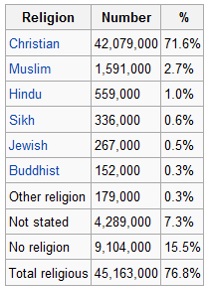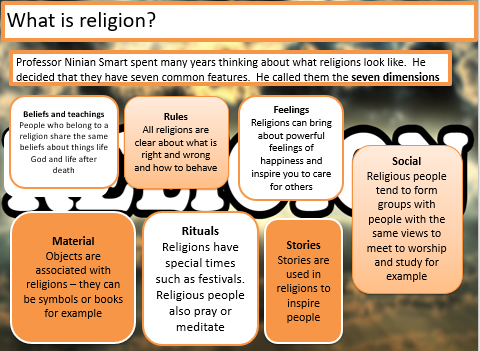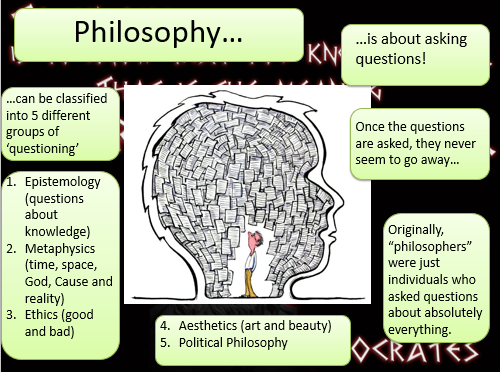|
|
|
Belief and Belonging
Lesson One: Who am i?
|
Religion: A set of ideas concerning the nature and purpose of the universe that is believed by a group of people.
The word ‘religion’ comes from the latin word ‘relegrare’ which means ‘to bind’. So, a religion is something that binds or keeps people together. People feel close to each other because they believe in the same things and live similar lifestyles. For example many religions believe that God exists. |
In Greek, philo means love – or devotion – and sophia means wisdom. Philosophers are people devoted to wisdom.
Philosophy scrutinises the claims made by religions. •It is about using logic and reason in order to do this. •It is about asking questions. |
Lesson two: What is Religion?
Dictionary defintion
“ a set of beliefs concerning the cause, nature, and purpose of the universe, especially when considered as the creation of a superhuman agency or agencies, usually involving devotional and ritual observances, and often containing a moral code governing the conduct of human affairs”
“ a set of beliefs concerning the cause, nature, and purpose of the universe, especially when considered as the creation of a superhuman agency or agencies, usually involving devotional and ritual observances, and often containing a moral code governing the conduct of human affairs”
During the 2001 census which is a survey taken every 10 years of the UK, people decided to write Jedism down as an answer to the question what is your religion? he 2001 census established that they were 390,127 practising Jedi in the UK. On the 2011 census there was no option for Jedi even though the numbers supassed both Judaism and Sikhism. How do we decide what is and is not a religion?
Lesson Three: What is Philosophy?
|
What is Philosophy?
Philosophy is all about asking questions and trying to answer them, philosophy can often answers questions that science struggles or fails to answer. Questions such as does God exist? What is a perfect person? What is proof?
Proof is the evidence that establishes a fact or the truth of a statement. Genuine proof cannot be rejected by anybody who is open minded and totally honest, as proof should remove all areas of doubt in a persons mind. Proof is usually of a physical nature, for example seeing something with your own eyes, or the result of a well conducted experiment. Sometimes, in a court of law, all the evidence put together can act as proof. There are three main ways by which the existence of things can be proved. 1) Personal experience – ‘I have seen it, so I know it exists 2) Reliable evidence – ‘I have not seen it but other people have convinced me that they have, so I accept its existence’ 3) Using a chain of reasoning to reach a conclusion (logic) – ‘I have not seen it but there must be a logical reason to believe in its existence’ |
|
Knowledge Organiser
This knowledge Organiser will support you alongside your book and this website for revision for your assessment. |
| ||||||
